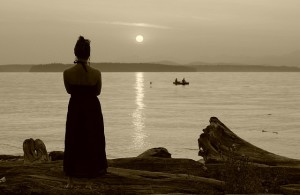Posts by Barbara O'Neal
The writing life is not an easy one, not at any stage of the game (sorry if you thought it was going to get better when you sold a book/sold ten books/got a starred review/went on tour/won an award/etc). Choosing to spend your life in the arts, any of the arts, means you have to bring your armor with you and defend against not only your own doubts, worries, and misgivings, but the messages from society that can undermine your efforts.
When I was a young writer, trying to stay true to my dream of publication in the face of the disbelief of everyone around me, fear and doubt were the biggest boulders in my path. My family and friends did not know any writers and thought it was cheeky, to say the least, that I fancied myself talented or smart or whatever enough to make that happen.
Like many of you, I had to face the external voices with a heart that was often pretty sure they were right. Who DID I think I was to reach for this wildly improbably thing, that I should be a published writer?
The tools in my arsenal were fairly small. I had my love of the process—by the time I began to pursue publication seriously, I’d written five novels and I knew I could actually finish. That’s not small. I also knew I enjoyed the process. And, judging by my teachers and the small body of readers I’d allowed to see the work, I owned some ability to string words together.
Still. It took four years to find my voice and find the right direction for my work, and during that time, my courage flagged, over and over. I had no money, two very little boys, and this crazy dream. How to hang on?
During this period, someone gave me a book that introduced me to the idea of visualization and positive thinking. It seemed ridiculous, honestly, that it could work, but I needed some way to keep believing, so I tried it. Lots of different kinds of positive thinking and visualizations and affirmations. My husband thought I was crazy. My grandmother, good Southern Baptist, thought it was probably a sin.
And yet, you know, it kind of….worked. Visualizations eased my worry and let me work more efficiently. Affirmations helped me understand my fears and what caused them, and how to address them. A couple of tricks really improved my skills in certain areas.
Read MoreIt is a Monday as I write this, and Mondays are Art Days for me lately. I sometimes think I should cancel because the class is long, 2-1/2 hours, all afternoon, and I could be doing something useful in that time, like exercising or writing more pages, or cleaning my house, which has been a less than perfect place lately.
The truth is, I’m really busy with writing work. I have more Lark books coming, and a Barbara O’Neal book in progress (which is taking so much longer than the usual for a book of this sort!) and a surprise project fell in my lap over the summer that I could not possibly turn down. My word count for the next six months intimidates even me, with all my schedules and process checks and charts.[pullquote]
When I leave, I am more rested than if I’d slept the whole day. This, too, is a meditation, a place to let the girls in the basement regroup and talk among themselves without my buzzing, frustrated noises.
[/pullquote]
Busy. You might know something about this. Maybe you have a day job or a toddler (if you have an infant, enjoy this time and realize it is fleeting and beautiful) or family problems or like me, ten billion words to write in the next six months and you have no idea how you’ll get it all done. Technically, looking at the charts, the days needed, the hours I must spend working, this Monday Art Day thing is just a bizarre luxury.
Read MoreThe late great Ray Bradbury once said that a writer should read one poem, one short story and one essay every day. Most of us don’t read many short stories any more, but we read a lot of essays (often in the form of blogs).
Poetry is like the superfood of writing education. Reading it daily is one of the best possible things any writer of any ilk can do to improve the quality and precision of her work. We shy away from it sometimes, sure we can’t find poems that will hold meaning for us in the modern world, but believe me, there is a poem for every moment, every project, every mood and idea you’ve ever thought of.[pullquote]Poetry is good words, good phrases, like vitamins A and C and E, like minerals for your paragraphs.[/pullquote]
I’ve been on a kick of memorizing poetry. I happened to hear Mary Oliver on a podcast, talking about her work, and she read a few of my favorite poems. I stood in the garden, listening, starstruck, and thought, I need to have these poems in my head all the time.
So I started memorizing them. I began with Wild Geese, which is an exhortation to look outward, upward, let go of your loneliness and shame and breathe in the life all around you. “You do not have to walk on your knees for a hundred miles, repenting,” she says. And, “No matter who you are, no matter how lonely, the world offers itself to your imagination. It calls to you like the wild geese, harsh and exciting.” Read the entire poem here.
Who doesn’t recognize some piece of those emotions? We’ve all felt shame, and loneliness, and felt apart from things. In these few short lines, the shame is brushed aside, the loneliness and despair embraced, and we fly free with the wild geese “who are on their way home again.”
Such economy of language! Such a wise, understanding voice!
Read More
One of the great struggles of all writing is to create fresh, vibrant images and metaphors, to avoid the sin of telling and show the reader whatever it is we want them to see. I struggle with it as much as anyone, especially because I’ve been writing novels for a couple of decades now, and I only have my own eyes and ears out there in the world.
Recently, I’ve fallen in love with an app for my smart phone, 1 Second Everyday. The idea is simple—to record a one second video per day. It seems impossible that one second could show anything at all, but you’d be surprised. This is a one second video I recorded this morning.
You know what’s going on, right? I’m picking ripe English peas from my garden. On the surface, that’s a very simple act, but there’s a lot of detail and mood packed into that single second. The vines themselves, vigorous and fecund, the cool, even light of morning in the greenhouse, the pod itself snapping off in my fingers. The fingers belong to a woman who knows to plant peas in a shady place, who knows when to harvest them.[pullquote] Ordinary life is where all the miracles are. [/pullquote]
The app has made me think a lot about detail, about how we tell stories, how we choose from the thousands of seconds available in a single day to capture something.
Read MoreLast month, I talked about the cornerstones of building a strong female protagonist. This month, we’re going to dig a little deeper.
In Wild by Cheryl Strayed, the main character is a young woman who is at the end of her rope. She’s lost her mother and she can’t find her footing in the world, and on a whim, she decides to go on a hike on the Pacific Coast Trail, 1000 miles.
In many ways, it’s a classic quest story. She’s called to do this crazy thing. She’s woefully unprepared. She suffers and finds mentors and friends. She struggles through, meets bad guys. And finally reaches her goal.
But the actual story is internal. This is a very important part of building a female journey. A male journey often takes place in the external world—in battles and tests against actual physical enemies. Women’s journeys are more often about the internal road to herself. [pullquote]A male journey often takes place in the external world—in battles and tests against actual physical enemies. Women’s journeys are more often about the internal road to herself.[/pullquote]
Let’s backtrack a little to talk about why. Men and women approach the world differently. It begins very early.
Girls are often more dominant than boys as toddlers and all the way up to middle school (that hell of us all). They are more socially adept and able to manipulate the world more adroitly, and that gives them the advantage until they’re about 12 or 13—basically puberty. At that age, even a very mighty girl often starts to feel less sure of herself and her place in the world.
By high school, boys are much more certain of their place in life than girls. They’re bigger, stronger, and they’ve internalized the message that it’s a man’s world. Even with affirmative action and Title Nine and all the things we are struggling to put in place, most boys are pretty certain of their superiority.
What happens at age 12?
Read MoreIn December, I wrote about setting goals for being a better writer in 2015. As it is now March and we’ve had three months, it seemed a good time to check in. How are you doing? (If you want to check what you wrote, go to the comments here.)
Leaving out my usual quantitative goals, which are particular to my own writing style and won’t be interesting or inspiring to others, I wrote that my goals this year were:
–to do something that scares me, take a chance on the work in a way I haven’t done before
–to choose a particular aspect of writing to study
–to find writers I haven’t read and classics I haven’t explored
–come up with new ways to fill the well, “maybe take a class in watercolors or something.
–think about what would make my work more joyful, stronger, exciting to me
[pullquote][W]e as creators are born to take things apart and blow them up and play with new visions and see what makes our own souls sing.[/pullquote]
One thing worth mentioning is the fact that my output has been quite slow. We traveled in early January and I’m still healing from two knee surgeries, so my brain is not functioning at full power just yet. This is part of life, too, that we are not always writing under perfect conditions. I was happy to have written 13000 words in February, mostly in short stints sitting in my chair with my leg propped up and piled with ice. It’s not enough to meet my goals for the year, but it’s okay for a month when life was compromised.
–That book is fulfilling one of my goals—to take a chance, to try something that scares me. I have no idea where it will go from here, or how, but I’m glad to be leaping off the ledge again. It’s exhilarating.
–I haven’t chosen any particular thing to study this year.
Read MoreAfter reading Therese and Porter’s posts on the digital world and its effects on our thinking and productivity, I’ve been thinking a lot on the subject. How does all of this affect my life, my creativity?
Confession: despite my reputation as a flighty Gemini, I am not a multitasker. It’s precisely because of my scatteredness that I can’t be—I must focus on one task at a time or I lose things, break them, get lost in the Shiny Everything. In college, after losing my keys for the 400th time and having to call someone to be rescued, a friend said, “You need routines.”
Turned out, he was right. As a very scattered, always-thinking, always dreaming creative type, the only thing that makes it possible for me to manage life is to keep a set of pretty rigid routines. That means one thing at a time. I cook when I cook—if I try to do anything else with it (apart from listening to music), I will burn everything. I can’t walk away. If I walk my dog, I walk my dog. I don’t listen to music or podcasts. We just….walk. The notifications on my social media and email are turned off and I check one thing at a time. If I am going to write, I don’t open my web browser, and on distractable days, I use Freedom to lock myself out. I’m still reading an average of five or six novels a month, sometimes more, and I do read on an iPad, so the Internet is there. The one exception is if I watch TV, I might have my iPad open and flip around, but that’s down time and I feel it’s okay to not really focus on anything.
This is not to demonstrate my superior skills of concentration. It’s just that I didn’t realize I don’t multitask at all and that seemed so weird in the modern world that I had to give it some thought.
So I don’t multitask, but I am still absolutely, completely immersed in the modern world. I love technology, connectedness, social media, and access to everything I want, when I want it, now.
Last night, Christopher Robin said that he’d never seen The Best Exotic Marigold Hotel and he might like it. Since it has become my favorite movie (and our cross-over points for fiction of any kind are very small), I was delighted, so we settled in to find it. We looked through On Demand. It wasn’t available as a rental, only a $16 purchase. Tried NetFlix, and Amazon Prime, ditto. Not available yet. Undaunted, he tried iTunes and there it was, so we pulled it up and settled in to watch. Now apart from the slightly bloated size of our entertainment budget, it is kind of miraculous that this is possible. I don’t have to go anywhere. Whatever I want is right there, at the end of a mouse or a remote.
[pullquote]
The thing a writer who is focused on the long game will do at that moment is….wait for it….write the next book.
[/pullquote]
If I want to talk to one of my sons, I can text them or check out their Facebook profiles, send an email, even just call. If I want cat litter or shoes […]
Read More2014 was a year of great upheaval in my life, death, family divorce, illnesses and hospitalizations, as well as a health challenge of my own, requiring a lengthy period of downtime. It happens to all of us. Things come in clusters. And this was a year for my family’s life to be in chaos–and of course because I love them, I showed up.
Here’s the weird thing: somehow, I still managed to write almost 250,000 finished words. That’s a lot, at least for me. Two novels, a novella, and a non-fiction book.
Right? That’s a lot.
I was honestly quite surprised when I tallied the numbers—it all felt hectic and unfocused–rushing here and there, trying to find information for a sick parent, a bereavement flight; trying to find time to just listen to the wounded ones on the phone. Because while work matters, people matter more. Showing up is everything.
I have little memory of doing those pages. What I do remember is going to England in cold, wet January and reading a lot on the planes and in the evenings when we were tired from packing my mother-in-law’s estate all day. I remember worrying about my beloved. I also remember reading five full, long novels on that trip. I didn’t write a word.
In the spring, I finished my Master Class book, but I don’t really remember writing that, either. I do remember driving back and forth to a city 50 miles away to help care for my mother after a fall landed her in the hospital for nearly a month. [pullquote]Not-writing, the reading and gardening and quiet hours flying or resting made it possible for me to write a lot [/pullquote] I remember redecorating a bedroom so she could be on the main floor, and clearing the fridge of food that had gone bad because I was afraid my dad might inadvertently eat the wrong thing. I had to stay overnight a few times and I didn’t do any writing, although I had my notebook with me. I read a lot, probably another few novels.
Read MoreOne exquisite moment
On Sunday morning, I drove through town to have coffee with a friend. It was one of those exquisite fall days that sometimes arrive just before winter settles in—the aspens and cottonwoods are all bright yellow clouds of leaves contrasted against the cloudless blue sky and blue mountains—just dusted with snow—in the background. I had the same thought over and over, “It is such a beautiful fall day! I love the way that hillside looks! Look at the tree!” And my eyes were soaking in the sight of this line of trees and that ridge and the scatters of aspen groves I could see on the sides of the mountains. Over and over I thought, “It is so beautiful. This is the perfect day of this autumn. The PERFECT day.”
In the afternoon, I went to a friend’s house, and I finally pulled the car over to take a picture with my phone. It was the kind of amazing shot that makes you laugh, right, like this can’t even be real beautiful, and of course I posted it to Instagram, which posted to my Facebook page and to Twitter. Because that’s how life is right now.
Right now.
Right now, right now, right now. I thumb through my Instagram feed, looking at the moments taken from the lives of friends and strangers. There’s a photo of the beautiful potatoes from last night’s dinner, and a cat smiling and two girls dancing in tutus. Here is a photo of a tree, moody against the horizon, and my cat’s socked feet and the hundredth photo of the other cat lying on his back with his paws over his eyes because I think it is so danged cute. He has bandit stripes and it looks like he’s playing peek-a-boo. My beloved asked, “How many pictures are you going to take of this cat doing that?”
I dunno. A million more, maybe.
Because we document things now, don’t we? Everything, everything, everything. Instagram and Twitter and Facebook and Snapchat and Tumblr, photos and moments of all varieties. It begins to seem like a crazy jumble, and maybe it is. Maybe all of those moments begin to seem like noise, and nullify each other.
But as writers, this is what we always do—measure moments, capture moments, present moments.
Read MoreThere is an Elizabeth Gilbert post making the rounds this week dismissing fear as boring. Which it is, in a way, and I get the point of the post, but it strikes me as something we need to talk about sometimes.
What are you afraid of? Some writers are afraid of not being good enough. Some are afraid of fading into obscurity. Some are afraid that people will judge them, that they will lose love when people see through the words to the person they are, deep inside. Some are afraid to be called a hack.
My first fear as a writer was very clear and direct: I was terrified that I would not find a way to get published, that I would not have the writing life I wanted more than an end to war and food for all the hungry in the world, small as that might make me sound. I burned to publish, achieve that stamp of legitimacy and honor, and be paid soundly for my work. I wanted it so much that I labored for five years in total poverty, trying one thing and another and another, burning sage and chanting over manuscripts before I mailed them to agents or editors out in the far away world. I burned with it, ached with it. Fear spurred me to work when I could barely see with my exhaustion.[pullquote]Articulating a fear can take it from being a monster in the closet to something you can wrestle down.[/pullquote]
If I examine that fear a little however, what was at the core of it? What would be the worst thing that would happen if I didn’t have a writing career? If I worked as a journalist or a social worker or a psychologist? I was afraid of being really ordinary, another mother raising another set of children, cooking meals, never daring anything. I was afraid I would not test myself enough, and my life would just add up to another invisible woman’s life in a small city in a mountain state.
My fear drove me in those days, but fear can also be debilitating. I spent the day with a tortured writer a couple of months ago. Writing takes her a long time, a long painful time of false starts and tossing things out and starting over again. Doubting every step, questioning every move. I know this is seen as an artistic mode of writing and I know many other writers, very successful writers, who employ this process. But it strikes me as incredibly painful, a process so rooted in doubt and fear that it cripples the creative process. Rather than stabbing fingers into her pain, I held my tongue, but I wanted to ask her to articulate her fear. What are you afraid of?
Read MoreGore Vidal famously said that every writer has a repertory company of players. He thought Shakespeare had about fifty, Hemingway only one, and himself around ten.
I found this quote while pulling together material for Writing Romantic Fiction and it has been swirling around in my mind ever since. If all writers have a repertory company, then I must have one, too. On a flight one morning, I drank coffee and stared out the window at clouds and sky and tiny box towns far below, and thought about that. Who are my characters?
Turns out Vidal was right. I can come up with a company of very specific characters. One major player is a version of Demeter, an earth mother who brings the spring. She likes to cook, and often grow things; she’s creative in some way. She tends to be tall or robust, with significant hair in some form. She is very often the main character in many of my women’s fiction novels, and was often the lead in my romances, as well. There are other leads, but this one tends to be my favorite.
I also discovered Persephone in the line-up, the lost child who needs help and mothering, often by the Demeter character. She’s often an adolescent, or motherless, and troubled in some way. She’s Portia in The Lost Recipe for Happiness, and Katie in How to Bake a Perfect Life and Natalie, the seven year old baby foodie in The Secret of Everything.
There are men, of course. The dark-haired (often curly-headed) man, often ethnic and serious or studious or even sad. He’s Julian in The Lost Recipe for Happiness, and Solomon in A Bed of Spices, and Isaiah in The Sleeping Night (playing opposite the lost, motherless Angel). I often write a beautiful, troubled, lost man who needs connection to make peace with—whatever. The Rebel/Rouge/Bad Boy with a heart of gold, who is Blue in In The Midnight Rain and Zeke in Breaking the Rules.
I have a very specific penchant for casting Sam Elliot, at many ages, in lots of roles. It’s not even conscious, really—I just notice that I’ll be writing along, and once again, Sam will be taking the role. The dad in this book, the lover in that, the friend in yet another.
I like a wise woman character, too, who is often—weirdly—a ghost. Maybe she represents my ancestors, my dead grandmother and other women who guided me. She’s vigorous and powerful and wise, and often quite beautiful, even in advanced age. She understands the world and her place in it, and often provides insight for the main character. In Lady Luck’s Map of Vegas, she’s a living breathing woman, Eldora, and not so much wise as experienced.
Often my sidekick characters are dogs or cats, which made me laugh. It’s true for many of us, though, isn’t it? We find connection and support in our pets. Animals can save us.
I wondered for awhile if exploring this idea would make me appear to be a hack in some way, if it would take away some of the pleasure of reading the work. But we are writers here, dissecting our own […]
Read More













